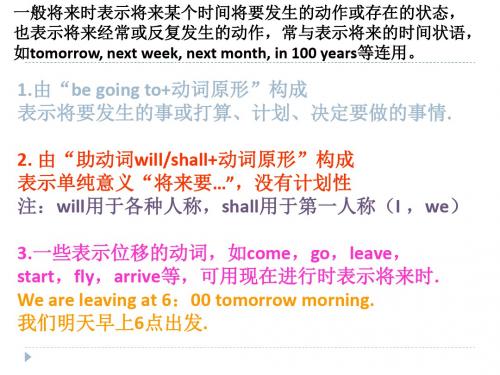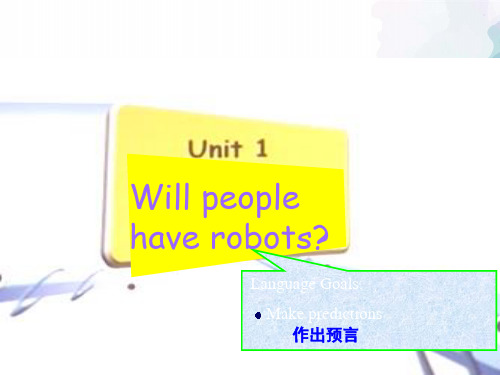人教版英语八年级上一般将来时课件
合集下载
人教版八年级英语上册第七单元复习课件(一般将来时))

better in the evening.
单项选择
1.There__C__a meeting tomorrow afternoon.
A.will be going to B.will going to be
C.is going to be D.will go to be
2.Charlie__c__here next month.
Some day people will go to the moon . 否定句:在will 的后面加not即可。will not
可缩写为 won’t
They will not ( won’t ) use books .
❖一般疑问句:把will 提到句子主语之前, 结尾变问号。
Students will go to school in the future ? Students will go to school in the future ?
* 重点短语: fewer + 可数名词复数 less + 不可数名词
1、在将来__in__th_e__fu_t_u_re_____2、50年后__in__5_0_y_e_a_r_s___ 3、更少的树木_f_e_w_e_r_t_re_e_s___4、更少_l_e_s_s__tim__e______ 5、参与、起作用_p_la_y__a__p_la_r_t(_ro_l_e_) ___ 6、许多、大量_h_u_n_d_re_d_s__o_f ____7、寻找_l_o_o_k _fo_r__________
A.rain B.will rain C.rains D.would rain
8.When Mary ___B____ next Sunday,we will go boating
单项选择
1.There__C__a meeting tomorrow afternoon.
A.will be going to B.will going to be
C.is going to be D.will go to be
2.Charlie__c__here next month.
Some day people will go to the moon . 否定句:在will 的后面加not即可。will not
可缩写为 won’t
They will not ( won’t ) use books .
❖一般疑问句:把will 提到句子主语之前, 结尾变问号。
Students will go to school in the future ? Students will go to school in the future ?
* 重点短语: fewer + 可数名词复数 less + 不可数名词
1、在将来__in__th_e__fu_t_u_re_____2、50年后__in__5_0_y_e_a_r_s___ 3、更少的树木_f_e_w_e_r_t_re_e_s___4、更少_l_e_s_s__tim__e______ 5、参与、起作用_p_la_y__a__p_la_r_t(_ro_l_e_) ___ 6、许多、大量_h_u_n_d_re_d_s__o_f ____7、寻找_l_o_o_k _fo_r__________
A.rain B.will rain C.rains D.would rain
8.When Mary ___B____ next Sunday,we will go boating
初中英语人教版八年级上册一般将来时

be going to与will的区别
will
未经事先考虑的意图,临时决定的。 事先考虑好的意图,或做好安排.
be going to
If you want to go, I’ll meet you at 5 o’clock. (临时的决 定) I feel terrible, I think I’m going to be sick. I’m going to be 16 years old next year. Look at the clouds! It’ s going to rain! (表示有迹象要发生某一动作时,要用be going to)
当它们用于一般将来时态时, in后接“时间段”,
after后接“时间点”。
1. He’ll come back in three years. 他三年以后回来。
2. He’ll come back after three o’clock. 他三点钟以后回来。
例句:
1.I will call you this evening. 2.Students will use computers to learn in the future. 3.He will help his sister with her lessons. 4.We won`t be free(空闲的) this afternoon. 5.She will not listen to me. 6.The birds won`t fly away to the south when the weather turns cold. 7.There will be a strong wind soon. 8.I will not tell it to him. 9.I think it will be very hot in Beijing next summer. 10.He will use his pen and his calculator. 11.Will there be heavy rain and strong winds?
英语一般将来时课件

English general future tense courseware
contents
目录
The definition and structure of the general future tense The basic usage of the general future tense Special usage of the general future tense
structure
02
The basic usage of the general future tense
Arranging a date
"I will see you on Sunday at 3pm."
Scheduling an event
"The conference will start at 9am on May 1st."
Meaning: This structure is used to express a future event that is not planned or scheduled, but is something that will happen if certain conditions are met.
Usage: The general future tense is used to express actions or situations that are not yet in progress or completed. It is commonly employed in conditional sentences, promises, and statements about future plans or events.
一般将来时课件ppt(共17张PPT)

Jim going to
afternoon?
in the playground tomorrow
4. .Jim is going to play football in the playground tomorrow afternoon.
Jim going to play football tomorrow afternoon?
2)在浊辅音和元音后读/d/.
一般过去时, 要用动词过去式. Jim is going to play football in the playground tomorrow afternoon.
Jim is going to play football in the playground tomorrow afternoon. ⑵are变为were。
there were many beautiful flowers there. 一般将来时表示将来某个时间要发生的动作或存在的状态常与表示将来的时间状语连用
⑴am ,is变为was。
So she They to read some books.
What did they do in the park? 1)在清辅音后读/t/ .
(3).动词过去式变化规则
a)一般情况下,直接加ed.如:wash--washed, look---looked; b)以不发音字母e结尾的,加d.如:like---
liked, dance---danced; c)以“辅音字母+y”结尾的,变y为i再加ed. 如:study---studied;
food and (play) lots of games. They
(come) home at 4:30.
一般将来时(28张PPT)初中英语专项复习课件

v.欣赏,享受
No8.invite
v.邀请
turn系列
turn/on/off/up/down
“到达”系列 arrive in/at get to/reach
1.定义
一般将来时
将要发生的动作或者状态
➢ Demi will be 18 years old. ➢ It's cloudy.It is going to rain.
有will提will
有be提be
小结
一般将来时
一般将来时 6.特殊考点
there be句型与将来时
there will be there is/going to be
现在进行时表将来
come; go; arrive; leave; fly; land
• YOUR LOGO
附:一般将来时考点 思维导图
练一练
Is your isn't
going to visit
口诀2:有 be 提 be
练一练
B
练一练
D
There be与一般将来时
There be 句型 There is a party.
➢ sb. be going to do
There is going to be a party tomorrow.
汇报人:稻壳儿
练习
C B
A
THANK YOU
有be提be
5.句型转换
一般将来时
Demi will eat cakes tomorrow.
否定句: Demi will not eat cakes tomorrow.
=won’t 一般疑问句: Will Demi eat cakes tomorrow? 回答: 肯定回答:Yes, She will. 否定回答:No,She won't. 特殊疑问句:
初中英语人教版八年级上册一般将来时

ll / will + V原型
时态:一般将来时 The Simple Future Tense
3、 shall与will的区别:
shall
shall常用于第一人称.
否定式:shall not = shan’t 缩略形式 ’ll
will
will常用于第二、三人称,但在 口语中各种人称都可以用will. 否定式:will not = won’t
时态:一般将来时 The Simple Future Tense
4、基本句型:
肯定句 S. + shall / will +V原型 S. + shall / will +not + V原型 否定句 一般疑问句 shall / will + s. + V原型? 特殊疑问句 特殊疑问词 + 一般疑问句 Yes, I shall. / Yes, I will. 简略回答 No, I shan’t. / No, I won’t.
时态:一般将来时 The Simple Future Tense 1、概念:
⑴表示将要发生的动作或存在的状态. 我们明天去看他。 We shall go to see him tomorrow. ⑵表示将来经常或反复发生的动作. 从现在起我将每天来。 From now on I shall come every day.
时态:一般将来时
6、练习翻译:
The Simple Future Tense
⑴五天后,Jim就15岁了. Jim will be fifteen years old in five days. ⑵明天我爷爷不会去钓鱼. My grandfather won’t go fishing tomorrow. ⑶你下个月将会来长沙 吗? Will you come to Changsha next month? ⑷我们什么时候再见面? When shall we meet again?
时态:一般将来时 The Simple Future Tense
3、 shall与will的区别:
shall
shall常用于第一人称.
否定式:shall not = shan’t 缩略形式 ’ll
will
will常用于第二、三人称,但在 口语中各种人称都可以用will. 否定式:will not = won’t
时态:一般将来时 The Simple Future Tense
4、基本句型:
肯定句 S. + shall / will +V原型 S. + shall / will +not + V原型 否定句 一般疑问句 shall / will + s. + V原型? 特殊疑问句 特殊疑问词 + 一般疑问句 Yes, I shall. / Yes, I will. 简略回答 No, I shan’t. / No, I won’t.
时态:一般将来时 The Simple Future Tense 1、概念:
⑴表示将要发生的动作或存在的状态. 我们明天去看他。 We shall go to see him tomorrow. ⑵表示将来经常或反复发生的动作. 从现在起我将每天来。 From now on I shall come every day.
时态:一般将来时
6、练习翻译:
The Simple Future Tense
⑴五天后,Jim就15岁了. Jim will be fifteen years old in five days. ⑵明天我爷爷不会去钓鱼. My grandfather won’t go fishing tomorrow. ⑶你下个月将会来长沙 吗? Will you come to Changsha next month? ⑷我们什么时候再见面? When shall we meet again?
人教版八年级上册一般将来时课件

请写出以下句子个三种句式: People will have robots in the future. There will be an English contest in our school.
补充说明:
There be 表“将来有…”时 用There will be 表示某地将存在某物,有时可与there is/are going to be 相互换。 There be 句型只表示存在关系,人或物并不属于某个地方,所以 句中不能出现表示所由关系的have/has There will be a football match on TV this afternoon. There will be word peace.
Look at thouse black clouds! It’s going to rain. (表推测) 在表示预测时,是说话人做出的预测,而不是天气it在做预测。
will do的常用标志词:
in the future 将来, tomorrow 明天, this evening 今晚上, next week /month/year下周/月/年,in + 时间段。也可在when, before , after, until等引导的时间状语从句中使用。
—Father’s Day is around the corner. I __A__ a gift for my father.
A. am going to buy
B. have bought
C. bought
D. was buying
(2022 安徽)
Exercise:
3. —There __B__ a basketball game against Class Two this Sunday.
补充说明:
There be 表“将来有…”时 用There will be 表示某地将存在某物,有时可与there is/are going to be 相互换。 There be 句型只表示存在关系,人或物并不属于某个地方,所以 句中不能出现表示所由关系的have/has There will be a football match on TV this afternoon. There will be word peace.
Look at thouse black clouds! It’s going to rain. (表推测) 在表示预测时,是说话人做出的预测,而不是天气it在做预测。
will do的常用标志词:
in the future 将来, tomorrow 明天, this evening 今晚上, next week /month/year下周/月/年,in + 时间段。也可在when, before , after, until等引导的时间状语从句中使用。
—Father’s Day is around the corner. I __A__ a gift for my father.
A. am going to buy
B. have bought
C. bought
D. was buying
(2022 安徽)
Exercise:
3. —There __B__ a basketball game against Class Two this Sunday.
初二八年级英语教学课件 一般将来时, 比较级,重点短语

2. In 100 years, there will be__m_o_r_e__ cars because there will be __m__o_r_e__ people in the cities.
3. There will be___fe_w__e_r jobs for people because__m__o_r_e_ robots will do the same jobs as people. 4. I think there will be__le_s_s__ cities because
特殊疑问句:特殊疑问词+will +主语+动词原形+其他成份?
When will people have robots in their homes?
“There be”句型的一般将来时 肯定句: There will be +名词+其他成份 [注意]:无论后面加单数名词或复数形式,be都必须用原形。
否定句:在will / shall 的后面加not即可。will not = won’t People will not (won’t) have robots in their homes.
一般疑问句:把will / shall 提到句子主语之前,结尾变问号。 Will people have robots in their homes?
will / shall引导的一般将来时:一般将来时表示将来发生的动作或情况,最基本的结 构:will / shall + 动词原形
“主谓(宾)句型”的一般将来时:
肯定句:主语+ will / shall +动词原形+(宾语)+其他成份 People will have robots in their homes.
3. There will be___fe_w__e_r jobs for people because__m__o_r_e_ robots will do the same jobs as people. 4. I think there will be__le_s_s__ cities because
特殊疑问句:特殊疑问词+will +主语+动词原形+其他成份?
When will people have robots in their homes?
“There be”句型的一般将来时 肯定句: There will be +名词+其他成份 [注意]:无论后面加单数名词或复数形式,be都必须用原形。
否定句:在will / shall 的后面加not即可。will not = won’t People will not (won’t) have robots in their homes.
一般疑问句:把will / shall 提到句子主语之前,结尾变问号。 Will people have robots in their homes?
will / shall引导的一般将来时:一般将来时表示将来发生的动作或情况,最基本的结 构:will / shall + 动词原形
“主谓(宾)句型”的一般将来时:
肯定句:主语+ will / shall +动词原形+(宾语)+其他成份 People will have robots in their homes.
人教版-英语-八上-1单元 Will people have robots语法课件1)

Will people have robots?
Language Goals:
Make predictions 作出预言
时态:一般将来时 The Simple Future Tense
我们以前学过哪几 种时态表将来?
时态:一般将来时
The Simple Future Tense ⑴be going to + V原形
Picture 3
Will kids go to school? 孩子们会去上 学吗?
Will kids go to school?
小山羊、小山羊皮
9、kid
(n.) (口语)小孩 kid =child kids =children
(口语)欺骗、耍弄、开玩笑
过去式 kidded
变化
(v.)
现在分词 kidding
___A___D 1.People will have
robots in人们th在ei家r将h有o机me器s.人. ___人A__们_D将2.P会eop不le w用on钱’t u.s所e m有one的y. E东ver西ythi都ng 是will免be 费free的. .
___A___D书3只.Bo会oks在will电on脑ly b上e on,co而mpu不ter会,not在on纸pap上er..
___A___D 4.Kids won’t go to school. They’ll study at home on
孩子们co将mpu不ter上. 学.他们在家用电脑学习.
___A___D 5.Ther世e w界ill o上nly只one有cou一ntr个y. 国家.
___A___D 6.Peopl人e wi们ll li将ve t会o be活20到0 ye2a0rs0o岁ld. .
Language Goals:
Make predictions 作出预言
时态:一般将来时 The Simple Future Tense
我们以前学过哪几 种时态表将来?
时态:一般将来时
The Simple Future Tense ⑴be going to + V原形
Picture 3
Will kids go to school? 孩子们会去上 学吗?
Will kids go to school?
小山羊、小山羊皮
9、kid
(n.) (口语)小孩 kid =child kids =children
(口语)欺骗、耍弄、开玩笑
过去式 kidded
变化
(v.)
现在分词 kidding
___A___D 1.People will have
robots in人们th在ei家r将h有o机me器s.人. ___人A__们_D将2.P会eop不le w用on钱’t u.s所e m有one的y. E东ver西ythi都ng 是will免be 费free的. .
___A___D书3只.Bo会oks在will电on脑ly b上e on,co而mpu不ter会,not在on纸pap上er..
___A___D 4.Kids won’t go to school. They’ll study at home on
孩子们co将mpu不ter上. 学.他们在家用电脑学习.
___A___D 5.Ther世e w界ill o上nly只one有cou一ntr个y. 国家.
___A___D 6.Peopl人e wi们ll li将ve t会o be活20到0 ye2a0rs0o岁ld. .
人教版英语八年级上册unit6ppt课件

=violinist
[例句] He wants to be a violinist.
[联想]piano(钢琴)+ -ist (名词后缀)= pianist(n.钢琴家)
• art(艺术)+ -ist (名词后缀)=artist (艺 术家)
精选ppt
46
7.driver n.驾驶员; 司机 • [巧记]driv(e) (v.驾驶,开车)+ -er(名
20 years ……
注意:
对“in+一段时间”提问,要用how soon (多 久以后)
People will live to be 100 years old in 20 years.
How soon will people live to be 100 years old?
精选ppt
40
• 1.grow up 长大;成熟;成长
Unit6 I’m going to stud computer science.
Learning goals: 1.学会一般将来时 2.有一个梦想!
精选ppt
2
a student
a waiter
a nurse
a reporter
a policeman
an actor
a professional
一般现在时
future
past now He is watching TV now.
现在进精选行ppt 时
28
一、什么是一般将来时?
future
past now 一般将来时态表示在将来某一时间将发 生的动作或存在的状态。
He is going to/will watch TV tomorrow evening.
英语语法一般将来时 课件 (共35张PPT)

afternoon。
选择:要动动脑啦
1. My younger brother ____be 15 years old next year.
A. will B. is going C. should
2. — Sorry, I forgot to post the letter for you.
— Never mind, _____ post it myself tonight.
Vicky w__ill__be_ 15 years old next year.(be) Vicky 明年15岁了
Will 表示单纯“将要,将来会”无计划性,陈 述事实
三、句型变化 1. 肯定句: 主语+ will +V原型
I will be a teacher in the future. 2.否定句:主语 + will not(won’t)+V原型
be 随主语有am is are 变化
1. 肯定句: 主语 + be going to + V原型
I am going to fly kites the day after tomorrow.
2. 否定句:主语 + be not going to + V原型
She is not going to be a doctor when she grows up.
B: He will go to Australia. A:What will he do?
B: He will see kangaroos
2.be going to+动词原形
be going to ①表示计划,安排要做的事 ②表示现在的迹象推断未来可能
选择:要动动脑啦
1. My younger brother ____be 15 years old next year.
A. will B. is going C. should
2. — Sorry, I forgot to post the letter for you.
— Never mind, _____ post it myself tonight.
Vicky w__ill__be_ 15 years old next year.(be) Vicky 明年15岁了
Will 表示单纯“将要,将来会”无计划性,陈 述事实
三、句型变化 1. 肯定句: 主语+ will +V原型
I will be a teacher in the future. 2.否定句:主语 + will not(won’t)+V原型
be 随主语有am is are 变化
1. 肯定句: 主语 + be going to + V原型
I am going to fly kites the day after tomorrow.
2. 否定句:主语 + be not going to + V原型
She is not going to be a doctor when she grows up.
B: He will go to Australia. A:What will he do?
B: He will see kangaroos
2.be going to+动词原形
be going to ①表示计划,安排要做的事 ②表示现在的迹象推断未来可能
初中英语语法 一般现在时、过去时、将来时完整ppt课件

egtwoplusfourmoongoesaround经常性习惯性的动作经常性习惯性的动作目前的爱好能力目前的爱好能力客观事实客观事实动词三单形式规则变法
一般现在时、一般过去时 、将来时
精选课件PPT
1
Let's distinguish!
1. He does his homework every day. 2. I am a teacher. 3. We played the piano last Sunday. 4. They were at school just now.
going to 多用于自己打算、计划或有意做某事。
• 二、探究:
•1、动词come/go/leave/move/arrive/start等不和be going to连用,常用be
coming/going/leaving/moving/arriving/starting等来表示即将发生或安排好要做
的事。
---I ______ to the Great Wall.
A. go B. went
C. will go D. have gone
精选课件PPT
11
一一.一般般将将来来时时是(S表im示p从le现在fu开tu始re将t来en要s发e)生的事。
二.肯定句构成: 1. be going to do sth. 2. will / shall do sth.
Yes, they were.
No, they weren’t.
He could swim at the age of ten.
He couldn’t swim at the age of ten.
It took two hours to go there.
一般现在时、一般过去时 、将来时
精选课件PPT
1
Let's distinguish!
1. He does his homework every day. 2. I am a teacher. 3. We played the piano last Sunday. 4. They were at school just now.
going to 多用于自己打算、计划或有意做某事。
• 二、探究:
•1、动词come/go/leave/move/arrive/start等不和be going to连用,常用be
coming/going/leaving/moving/arriving/starting等来表示即将发生或安排好要做
的事。
---I ______ to the Great Wall.
A. go B. went
C. will go D. have gone
精选课件PPT
11
一一.一般般将将来来时时是(S表im示p从le现在fu开tu始re将t来en要s发e)生的事。
二.肯定句构成: 1. be going to do sth. 2. will / shall do sth.
Yes, they were.
No, they weren’t.
He could swim at the age of ten.
He couldn’t swim at the age of ten.
It took two hours to go there.
人教八年级上册 Unit7 一般将来时态专项讲解 课件

Everybody has his dream job. Every time when people asked me, “What do you want to be in the future?” I always answer “Being a doctor is my dream job.” It is a great job because I am able to help sick people. I will fight with illnesses and make people feel happy and healthy again. But it's not easy to make it come true. I need a strong body and good grades to do it. So I make some __p_l_a_n_s _for it. First, I'm going to get lots of
healthy sure plans exercise doctor able with try subjects take
exercise such as running and swimming. And I must study really hard in all subjects .Then, I will go to Beijing Medical College after I finish my high school. I'm going to _ta_k_e___ medical lessons in this school. My parents and friends agree with me.They all like to help me. And I will try my best to follow the plans. I am sure about my dream. What's your dream job?
healthy sure plans exercise doctor able with try subjects take
exercise such as running and swimming. And I must study really hard in all subjects .Then, I will go to Beijing Medical College after I finish my high school. I'm going to _ta_k_e___ medical lessons in this school. My parents and friends agree with me.They all like to help me. And I will try my best to follow the plans. I am sure about my dream. What's your dream job?
期末语法专项复习----一般将来时课件人教版英语八年级上册

定义 构成 标志词
将要发生的动作或状态
will do
be going to do next系列 in the future tomorrow系列 soon in 2222 in + 一段时间
句型转换
I will go to Disneyland in the future. I will not go to Disneyland in the future.
典型例题
5 - ______ there ______ a baseball match on TV tonight? -Yes, there is.
A. Will; have C. Is; going to have
BB. Is; going to be D. Will; be
你没给我糖果,所以我今晚会来。
There are gwoiilnl gbeto be two parties tomorrow.
there be 和 have 永不见面
there be
一般将来时 特殊考点
there will be there is/are going to be
4 In 2025, there __w_i_l_l _ __b_e___ hundreds of new buildings around here.
常见位移动词有:
come; go; arrive; leave; fly; land 来来去去着陆飞
一there is/are going to be
现在进行 时表将来
come; go; leave; arrive; fly; land
一般疑问句 be sb. going to do…?
回答
- 1、下载文档前请自行甄别文档内容的完整性,平台不提供额外的编辑、内容补充、找答案等附加服务。
- 2、"仅部分预览"的文档,不可在线预览部分如存在完整性等问题,可反馈申请退款(可完整预览的文档不适用该条件!)。
- 3、如文档侵犯您的权益,请联系客服反馈,我们会尽快为您处理(人工客服工作时间:9:00-18:30)。
A. will go B. go
C. goes
D. to go
• 1. There ___C_______ a meeting tomorrow afternoon.
• A. will be going to B. will going to be
C. is going to be
D. will go to be
________ free next week.
A. will be; is
B. is; is
C. will be; will be D. is; will be
• 4. There ___D_____ a dolphin show in the zoo tomorrow evening.
• A. was
Will 的位置:There + will+ be
•以后这里将会有一所学校。 •There _w_i_ll __b_e_ a school here in the future. •There _i_s__g_o_in_g_ _t_o__ _b_e__ a school here in the future.
• 你将使用电脑来发送你的作业吗? • A_r_e__ _y_o_u_ _g_o_in_g___to_ _u_s_e_ a computer to
send your homework? • 肯定回答:Yes, _I___am____. • 否定回答: No,I_'m___n_o_t__.
• Ia_m___ thirteen years old now. • Iw_i_ll__b_e___ fourteen after one year.
will 常缩略为’ll, 如:I'll, you'll
表示将来时的常见形式 • 1. will / shall+动词原形 • 2. be going to+动词原形
be going to+动词原形
(一)定义:表示将要发生的动作或安排,或打 算、计划、决定要做的事。也可用于预测天气。 What are you going to do this evening? I’m going to study English at a university. It's going to rain.
当堂检测
Ex 1: Choose the right answer.
1.Ihope that you__ a good time this evening.
A. have B. are having C. will have D. has
2. Look at those big black clouds. It __rain. Let’s hurry.
肯定陈述句: They are going to have a party tomorrow
否定陈述句:They are not going to have a party tomorrow. 疑问句:Are they going to have a party tomorrow?
Yes, they are. No, they aren't.
● in a few minutes ● in the future(将来) ● in five years
● the coming Sunday ● from now on(从现在开始) ●soon(不久)
1. Mary __w_i_ll_s_e_e_ (see) her grandfather tomorrow.
5.I _w_i_ll_s_t_u_d_y(study) English harder from now on.
6.They _w_i_ll_w__a_t_ch__(watch) a movie in the coming weekend.
联系其他时态变句型
肯定陈述句: They will have a party tomorrow.
be+doing表将来只适用于表示位置移动
的动词。 eg:go , come , leave , start , arrive , move , return 等,并常伴有表示将来时间的状语 以区别于进行时的动作。
He is leaving for Shanghai next week.
The NO.11 bus is coming in a minute.
• 2. Charlie __D______ here next month.
A. isn’t working B. doesn’t working
C. isn’t going to working D. won’t work
• 3. He __D______ very busy this week, he
• Today, computers a_r_e__ large. • But in the future, computers _w__il_l _b__e_ small.
• It _i_s__ hot in summer now. • But itw_i_ll__b_e___ cool in autumn.
• B. Are; going to be; will
• C. Are; going to; will be
• D. Are; going to be; will be
• 6. Mother ___A_____ me a nice present on
my next birthday.
• A. will give B. will give
特殊疑问句: What are they going to do tomorrow? What are they going to have tomorrow?
• 我将使用电脑来发送我的作业。
• I_w_i_ll_ __us_e_ a computer to send my homework.
• 我将使用电脑来发送我的作业。
• C. gives D. give
• 7. ____B____ a concert next Saturday?
• A. There will be B. Will there be
C. There can be D. There are
• 8. If they come, we __B______ a meeting.
The Simple Future Tense 一般将来时
(一)定义
(二)结构
(三)标志词
一般将来时
(一)定义:
1、表示将来某个时间要发生的动作或存在的状态: We will come to see you next week. In the future, there will be less fresh water .
• Now the weather _is___ bad in winter. • But it __w_i_ll __b_e_ good in spring next year.
•这里有一所学校。 •There _is___ a school here. •这里有两所学校。 •There _a_r_e_ two schools here. •这里以后将会有许多所学校。 •There w__il_l_ b__e__ many schools here in the future.
B. is going to have
• C. will have
D. is going to be
• 5. –___D_____ you ________ free tomorrow?
• – No. I ________ free the day after tomorrow.
• A. Are; going to; will
• I_a_m__n_o_t__go_i_n_g_ _to___u_s_e__ a computer to send my homework.
• 你将使用电脑来发送你的作业吗? • _W__il_l _y_o_u_ _u_s_e_ a computer to send your
homework? • 肯定回答:Yes, I____w_il_l __. • 否定回答: No, __I__ w__o_n_'t.
• I_a_m__ _g_oi_n_g __to__ _u_se__ a computer to send my homework.
• 我将不使用电脑来发送我的作业。
• Iw_o_n_'_t u_s_e__ a computer to send my homework.
• 我将不使用电脑来发送我的作业。
2、表示将来经常或反复发生的动作: The students will come and work in the lab once a week.
表示将来时的常见形式 • 1. will / shall+动词原形 • 2. be going to+动词原形 • 3. be+doing
There be句型将来时态 的两种表达
4.David _is__g_o_in_g__to__f_ly__(fly) kites in the park this weekend.
5.I __a_m__g_o_in_g__t_o_s_t_u_d_y_(study) English harder from now on.
6.They _a_r_e_g_o_i_n_g_t_o_w__a_t_ch__(watch) a movie in the coming weekend.
1. There + will+ be 2. There + be(is/are) going to + be
